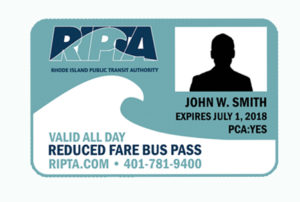Earlier this month, there was a big setback for many transit users in Rhode Island: the elimination of no-fare bus rides for low-income disabled and elderly people.
 Prior to February 1st, those who qualified could receive a no-fare bus pass, which enabled thousands of people to maintain independent lives – facilitating access to healthcare appointments, groceries, recreation and social activities. The no-fare bus pass had been available for more than 40 years. Yet despite much opposition and protest, RIPTA has proceeded with changes to the program.
Prior to February 1st, those who qualified could receive a no-fare bus pass, which enabled thousands of people to maintain independent lives – facilitating access to healthcare appointments, groceries, recreation and social activities. The no-fare bus pass had been available for more than 40 years. Yet despite much opposition and protest, RIPTA has proceeded with changes to the program.
The old program is being replaced by the “Valid All Day Reduced Fare Pass”, which allows those who previously held a no-fare bus pass to pay 50 cents per ride or 25 cents per transfer. 50 cents may not sound like a lot, but to those on a limited income, it can add up quickly.
Some further assistance is available. In response to the concerns of riders and organizations who support seniors and the disabled, Gov. Gina Raimondo announced a plan on January 31st – hours before the new reduced fare program came into effect:
“Governor Raimondo has offered, through the Rhode Island Division of Elderly Affairs (RIDEA) and the Office of Veterans Affairs (RIOVA), a “pilot program” of 10 one-way free passes per month for about 2,000 seniors and 10 one-way free passes for about 1,000 veterans. According to RIPTA, currently about 4,000 seniors use no-fare passes, and their average monthly usage is 31 one-way trips.”
These free passes are available on a first-come, first-served basis. through various veterans offices and seniors organizations (get the full list of locations here). This new program won’t come close to matching the old, but will be of some assistance to those who manage to get a pass.
RIPTA says it provided more than 11 million no-fare rides in a recent two-year window, and cutting the program will save $3.3 million this year. A recent editorial in the Providence Journal called the cuts “foolish”, saying:
“Our state has worked to encourage poorer older citizens to remain independent, something that improves their quality of life while saving taxpayers money. Surely there are other areas to cut in the state budget than rides for a relatively small group that needs this help.”
Meanwhile, according to Ray Gagne of the RI Organizing Project and Bill Flynn from the Senior Agenda Coalition, advocacy groups will not give up the fight:
“The RI Organizing Project, the Senior Agenda Coalition of RI, the Economic Progress Institute, the RI Coalition for the Homeless, the RI Interfaith Coalition to Reduce Poverty, the Mental Health Recovery Coalition and the RIPTA Riders Alliance will continue the fight to restore the No-Fare Bus Passes.”
